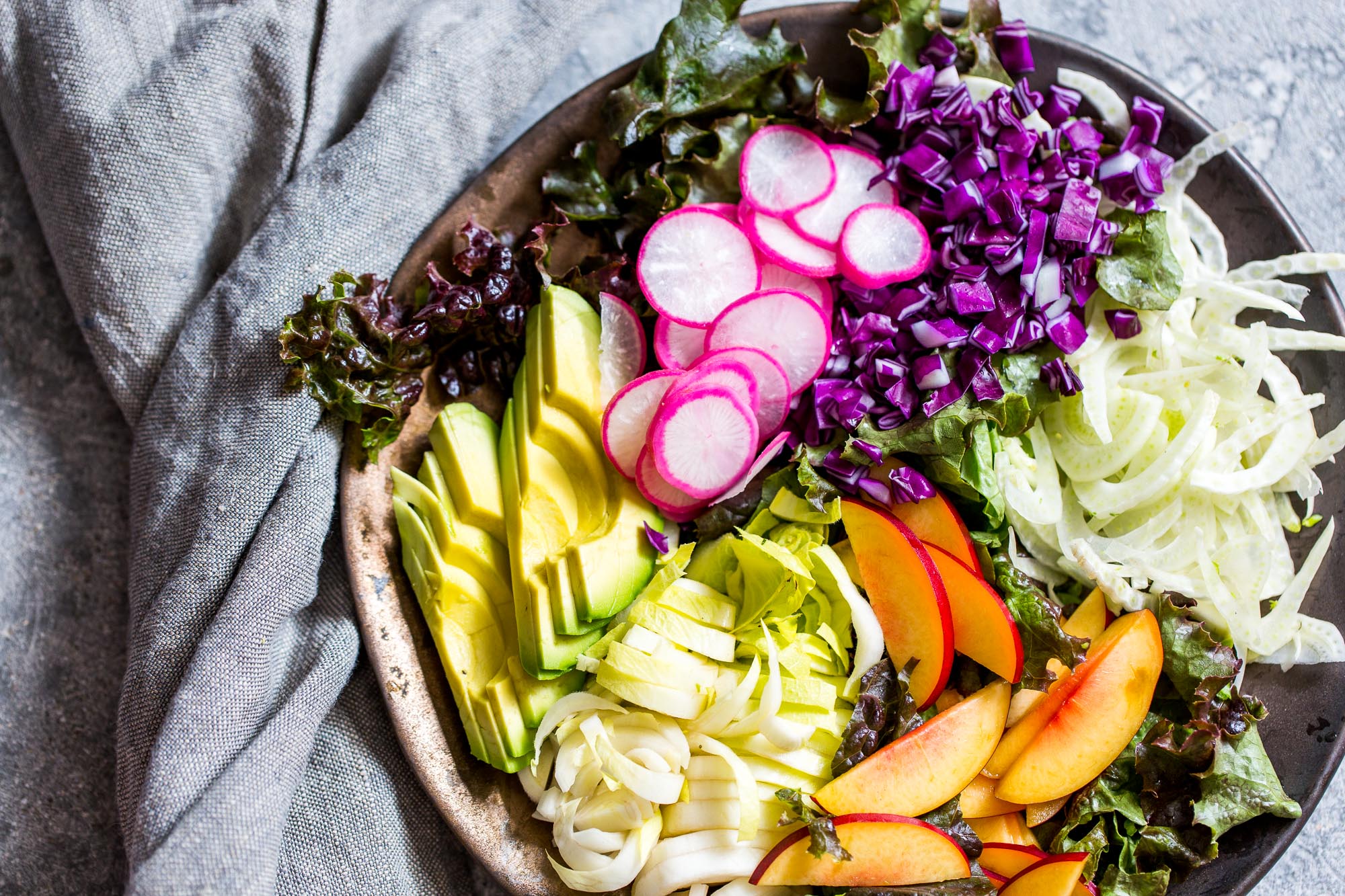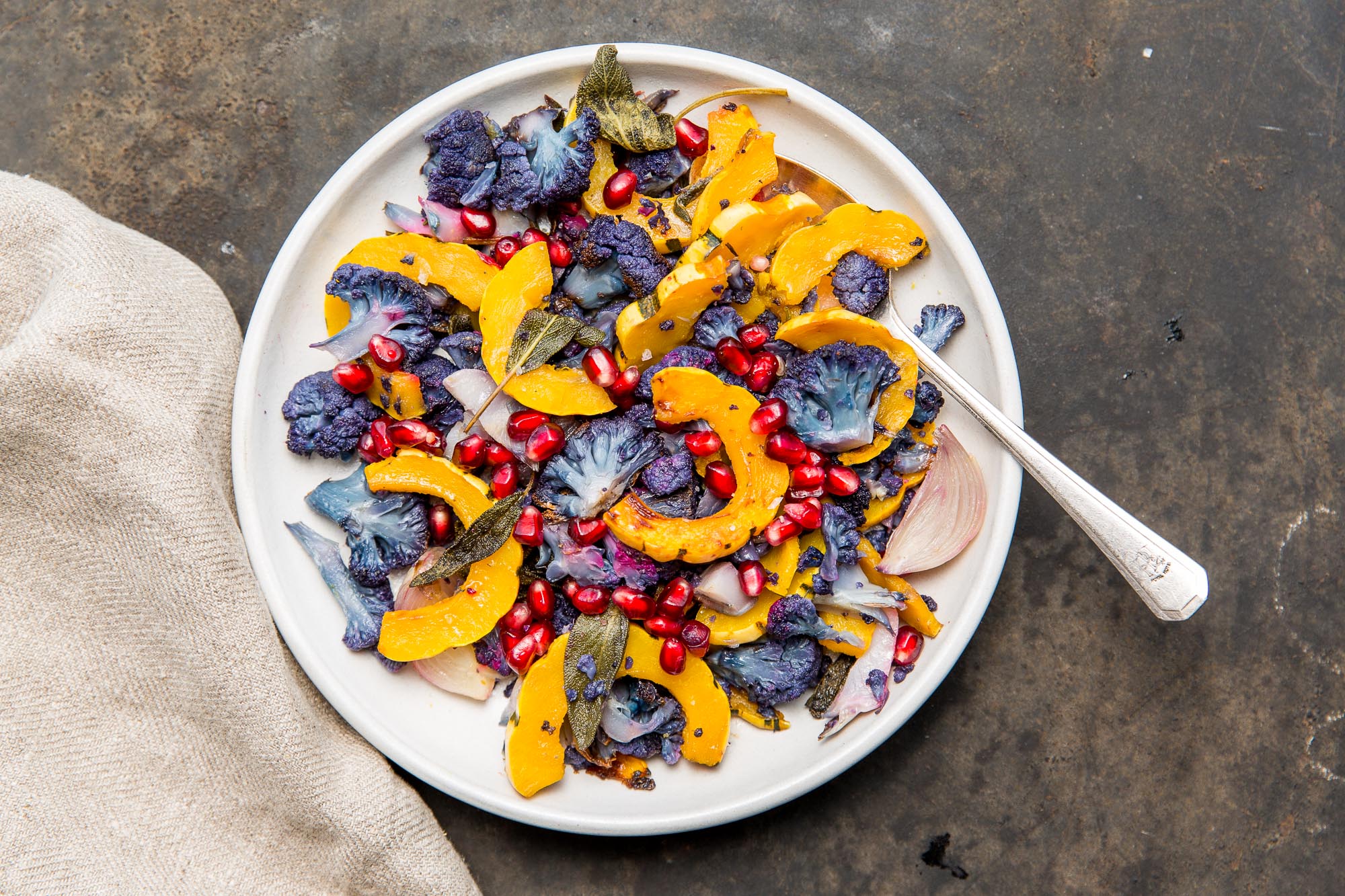Ginger-Roasted Brussels, Carrots, and Fennel

Since Natalie started nutrition school, and because we love talking about food, it doesn't take too long in conversation before someone asks a version of the question:
"Is this healthy?"
Is gluten-free healthy? Is kombucha healthy? Is coffee healthy? Is bacon healthy? Are eggs healthy? Are whole-grains healthy? Are chia seeds healthy? All of these types of questions, it turns out, are really hard to answer.
As a culture, we're constantly surrounded with buzz. Whether it's 'superfoods', starches, high-fiber, low-FODMAP, Mediterranean, meatless mondays - there's always someone who swears they know a way to improve health. And it's true, for them, it makes them healthier.
The problem is that we're all different, and finding health requires an individual path. Unfortunately, there is no magic answer. What's healthy for some, might be detrimental to others. The only thing worse than feeling like we are doing something wrong, is feeling like we're doing something right, but we still aren't getting healthier.
And that's overwhelming. It's easy to just throw up our hands and say, there's just too much to deal with.
So this post is about ways to sort through it all. This is how Nat and I have begun to approach our health and eating habits in our own life.
*Time-saving, water-saving tip: Rinse all the veggies in the same bowl of water.
1) Consider everything together. The more we learn about diet, bacteria, hormones, genetics, birth history, environment, the more we see how much is connected. Dr. Perlmutter gives a great introduction to the cutting edge of medicine in his books, Grain Brain and Brain Maker. We're used to thinking of our body divided into different systems - nervous, organs, skeletal, cardiovascular - but more science is starting to prove the efficacy of a holistic approach to medicine. We can't treat problems as isolated events.
2) Listen to your body. Our bodies are constantly telling us things about our health. From a diet perspective, one of the more interesting ideas is that anybody can be allergic to anything. And, as we learn more about allergy and inflammation as a path to broader problems, it's important to remove things that make us feel bad. A simple way to test if you're having a reaction to foods, is to do an elimination diet. We'll talk about this more in a later post, but essentially an elimination diet helps pinpoint suspected foods that make us feel bad. This is why Nat and I both avoid gluten and dairy.
3) Start testing. Any big change in health is really a collection of small changes. To avoid feeling overwhelmed, start with just one change, and treat it as a science experiment. There's no right or wrong, just focus on listening to how you feel. Maybe it's getting more sleep, eating more vegetables, removing certain foods, adding supplements, exercising more (or less - stress and over-training can lead to weight gain from high levels of cortisol). Sure, some things will make us feel better, some things worse. The point here is to just keep exploring - regardless of the outcome, it's important to give yourself credit for being bold enough to give it a try!
4) Eat more vegetables. This is the one piece of advice that Nat does feel comfortable recommending to everyone - it's never a bad thing to have more veggies. Vegetables have a ton of nutrients, vitamins, and building blocks for things like hormones and muscles (we need more than just protein). Variety is key, but you don't have to eat veggies you don't like. We try to eat with the seasons to avoid getting tired out from too much of one thing.
That's where this recipe comes in - a simple roast with a little ginger to bring up the natural sweetness in carrots and fennel. Carrots have a huge amount of vitamin A (in the form of beta-Carotene), K, C, and B6, and cooking actually helps make the nutrients easier to absorb. Brussels, carrots, and fennel all have anti-cancer properties as well. (Murray, 2005)
Ginger-Roasted Brussels, Carrots, and Fennel
Ingredients
- 1 lb Brussels sprouts, trimmed and halved
- 1 fennel, quartered and sliced
- 4-6 carrots, chunked
- 2 tsp ground ginger
- 4 Tbsp olive oil
- 1 tsp sea salt
Process
- Pre-heat the oven to 400ºF.
- Prep all veggies and add to a large mixing bowl.
- Add the ginger, oil, and salt. Mix well.
- Place the veggies on a baking sheet, and cover (we flip another baking sheet on top, but aluminum foil works, too).
- Roast covered for 20 minutes. Remove cover. Roast for another 10 minutes.
- Flip the veggies, and roast for another 5-10 minutes, until just starting to brown.
References: Murray, M., Pizzorno, J., Pizzorno, L. (2005). The Encyclopedia of Healing Foods. New York, NY: Atria Books.
Photography team on the West Coast. Mostly working with companies and magazines in the food world. Our clients are proud of their product, story, or mission (or all three), and we help them produce their idea into a reality.











